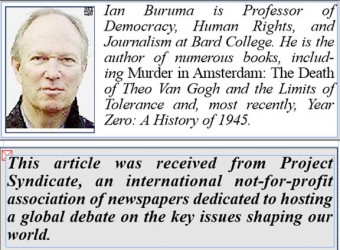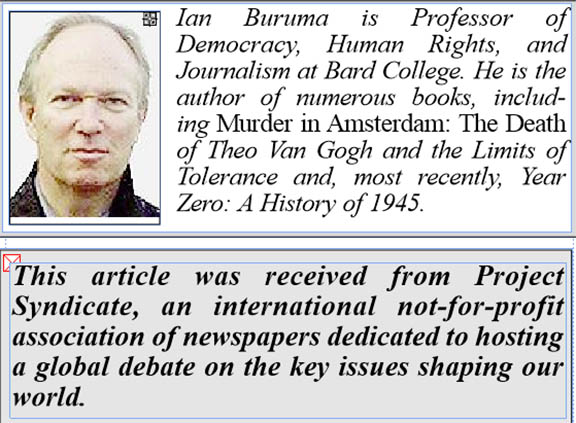By Ian Buruma
NEW YORK – US President Barack Obama is under attack – from so-called liberal hawks, more or less to the left of center, as well as from active interventionists on the right – for being a weak president, leading a war-weary (even world-weary) America in retreat.
 Obama’s critics, whether on the left or the right, believe that the United States has a unique calling to impose its will on the world. The only difference is that the former justify their views with talk of democracy and human rights, while the latter do not need any such justification, because, after all, America is the greatest country on earth.
Obama’s critics, whether on the left or the right, believe that the United States has a unique calling to impose its will on the world. The only difference is that the former justify their views with talk of democracy and human rights, while the latter do not need any such justification, because, after all, America is the greatest country on earth.
Either way, the premise that the US should lead forcefully rests on the idea that without a benevolent hegemonic power to police the world, chaos will ensue and more malevolent forces will take over. This opinion was expressed most clearly in a recent article by the conservative foreign-policy thinker Robert Kagan.
Kagan’s argument is that other countries cannot be relied upon to behave responsibly without strong US leadership. Like other hawks, he warns not only that dictators will behave badly if given the chance, which is certainly plausible, but also that democratic allies need to be kept in their place by a firm hegemonic hand.
In East Asia, for example, China must be “hemmed in” by strong US allies. But if Japan, America’s main ally in the region, were “much more powerful and much less dependent on the United States for its security,” it, too, should not be trusted.
Kagan may be right in thinking that a precipitous US retreat from East Asia could have dangerous consequences. But this argument has the familiar whiff of the late stages of empire. The European imperial powers of the twentieth century would periodically hold out the distant prospect of independence to their colonial subjects – but not yet, not before they were ready, not before their Western masters had educated them to take care of themselves responsibly. How long this education might take was anybody’s guess.
That is the paradox of imperialism. As long as the colonized are under the imperial cosh, they can never truly be ready, because the authority to run their own affairs, responsibly or not, was taken away from them.
Empires can impose order and stability for a long time; but imperialists – rather like many Americans today – become tired, and their subjects grow restless. The imperial order becomes brittle, and, as Kagan rightly notes, when the old order finally breaks down, mayhem often follows.
That happened in India in 1947, when the British left, Pakistan broke away, and roughly a million Hindus and Muslims died in mutual slaughter. But does this really mean that the British Raj should have lasted longer? If so, how much longer? It is just as plausible to argue that prolonged imperial rule could have made ethnic tensions worse. After all, those tensions were largely the result of colonial divide-and-rule policies.
So it is today, to some degree, with Pax Americana – a kind of imperial world order that was never a formal empire. Compared to most previous empires, it was relatively benign, though it is too easily forgotten how often the leader of the “Free World” subverted elected leaders and supported dictators, as in Chile, South Korea, El Salvador, Argentina, Indonesia, Guatemala, and so on.
The much-vaunted “liberal order” policed by the US was a product of World War II and the Cold War. Germany and Japan had to be kept down, the Communist powers had to be contained, and the old countries of Europe had to learn to live with one another under unifying pan-national institutions. All of this was made possible by American money and military might. As a result, the Free World, in Western Europe and East Asia, became a US dependency.
This cannot go on forever. Indeed, the arrangements are already fraying. But then comes the old imperial paradox. The longer others remain dependent on the US, the less capable they will be of taking care of their own affairs, including their security. And, like an authoritarian parent, the US itself, despite its admonitions to its allies to pull their weight, is often loath to let go of its increasingly unruly dependents.
When a new government came to power in Japan in 2009 and tried to break the postwar mold by initiating better relations with China and seeking to reduce its dependence on the US, the Obama administration sought to undermine this effort. The informal empire would not stand for that kind of insubordination.
In his recent foreign-policy speech at the US Military Academy at West Point, Obama barely mentioned East Asia. But if any region would benefit from the Obama doctrine, which promises to shift from military to more political approaches to regional problems, it is East Asia.
Still, Obama’s instincts are right. At least he has recognized the limits of America’s power to impose a global order by force. His success as a president rests less on the good things he has done (although he has done plenty) than on the stupid things he has avoided, like getting into more unnecessary wars.
This does not resolve the late imperial dilemma of how to reduce dependency on the hegemon without causing more tyranny and violence. But that painful and risky process will have to be launched eventually, and it will be better served by Obama’s brand of caution than by the tough talk of his critics.

